Archive for May, 2012
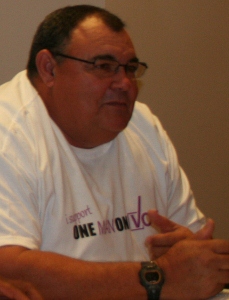
‘Be 1 of 8000’ campaign
 (CNS): The independent member for North Side says that the campaign for a ‘yes’ vote in this summer’s referendum on one man, one vote and single member constituencies is underway and will retain its focus on door to door canvassing. Under the slogan ‘Be one of the 8000’, the mark at which the ballot would be won, Ezzard Miller said he remained confident that despite the premier’s efforts to stack the deck against one man, one vote, the people of Cayman will come out and vote in favour of it on 18 July. He explained that district groups have been established where volunteers will be co-ordinating a strategic campaign and visiting the homes of voters.
(CNS): The independent member for North Side says that the campaign for a ‘yes’ vote in this summer’s referendum on one man, one vote and single member constituencies is underway and will retain its focus on door to door canvassing. Under the slogan ‘Be one of the 8000’, the mark at which the ballot would be won, Ezzard Miller said he remained confident that despite the premier’s efforts to stack the deck against one man, one vote, the people of Cayman will come out and vote in favour of it on 18 July. He explained that district groups have been established where volunteers will be co-ordinating a strategic campaign and visiting the homes of voters.
“We are continuing to find that the best way to educate the electorate about one man, one vote is in the comfort of their living rooms,” he said. “Although the campaign will now move on to a wider national strategic level, with public meetings, campaign leaflets and such, we are still going door to door.”
He explained that the district groups would be organising more informal meetings and socials where people can ask questions and discuss the issues in small groups rather than have politicians shouting them out from platforms. “We have found that people want to engage in dialogue and ask questions about the issues, and that’s the approach we will be taking,” Miller added.
Although Miller, along with the opposition members, recognise they now face an uphill struggle to get close to 8,000 'yes' votes in July's referendum, they are still confident that they can win.
“As we have said many times, the time is now,” Miller added, as he stressed once again the importance of equity in democracy.
Miller said campaigners were continuing to collect signatures for the original petition in order to continue to measure public sentiment and as an insurance policy. Although the campaigners have not undertaken an official count, the number of completed books and those in circulation suggest that close to 5,000 registered voters have now signed the petition, surpassing the requirement to trigger the people’s referendum.
Now that government has taken over the process, however, it will be embarking on a public funded campaign against one man, one vote and single member constituencies and a move to retain the status quo.
If the referendum is lost and less than 50% plus one of the country’s voters say ‘Yes’, it is still not clear how the people of Cayman will vote in the May 2013 general election. Although the premier had initially stated that he would be adding two seats to the district of George Town and one to Bodden Town to accommodate the growth of the Legislative Assembly to 18 members, he has also indicted that one seat could go to West Bay instead of two to George Town.
If the referendum passes the electorate will go to the polls and vote for just one candidate in their local single member constituency as set out in the Boundary Commission’s report of 2010, which inmost cases is in line with the existing polling areas.
For more information on the referendum and one man one vote contact any of the individuals listed below:
Al Suckoo Jr 916-1689 alva.suckoo@gmail.com
Johann Moxam jmoxam@hotmail.com
Noel March 916-1429 ntmarch@hotmail.com
Chris Goddard 928-6534 sportnzone@candw.ky
Betyann Duty 916-1494 bettyann.duty@hotmail.com
Kent McTaggart 928-3449 kent@spscayman.com
Bo Miller 916-0003 miller.bo@gmail.com
Sharon Roulstone 516-0220 cayshay@hotmail.com
Marco Archer 939-7474 msarcher@candw.ky
Bryan Ebanks 916-3048
Edward Caudeiron 916-0157 terrycaudeiron@hotmail.com
Terry Caudeiron 916-7895 terrycadeiron@hotmail.com
Ezzard Miller 327-5757 ezyhealth@telecayman.ky
Arden McLean 916-0630 arden@candw.ky
Woody Da Costa 916-2470 woodyd@candw.ky
Gregg Anderson 916-6777
Alden McLaughlin 916-3153
PPM Office 945-8292 ppm@candw.ky
Petition books are also available to sig at Four Winds Esso in West Bay, Walkers Road Texaco, in George Town, Pinnacle Condos on 7MB, as well as the Book Nook and Hobbies and Books.
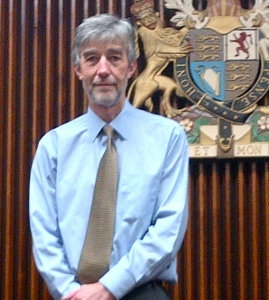
UK justice expert to manage Cayman courts
 (CNS): Following an open recruitment process Kevin McCormac has been appointed as the new court administrator. McCormac will be responsible for the overall management and administration of the non-judicial operations of the Courts. Directed by the chief justice, he will lead, manage and guide the strategic development and implementation of efficient and cohesive processes, court officials said Wednesday. He will also serve as chief officer for the Judicial Administration under the Public Finance and Management Law and the appointing officer under the Public Service Management Law.
(CNS): Following an open recruitment process Kevin McCormac has been appointed as the new court administrator. McCormac will be responsible for the overall management and administration of the non-judicial operations of the Courts. Directed by the chief justice, he will lead, manage and guide the strategic development and implementation of efficient and cohesive processes, court officials said Wednesday. He will also serve as chief officer for the Judicial Administration under the Public Finance and Management Law and the appointing officer under the Public Service Management Law.
McCormac has over 30 years’ experience in the management and development of courts and judicial systems in England and Wales.
According to an official release revealing his appointment, as Chief Executive to the West Sussex Magistrates’ Court Committee, McCormac was responsible for leading the Judiciary and staff through a major period of change at a time of increasing budgetary constraints. McCormac took early retirement from the United Kingdom Civil Service in October 2010, having served as Deputy Director in the Ministry of Justice.
Since his retirement he has undertaken a variety of roles from an employment appeals tribunal judge to the establishment of a legal aid clinic at Zagreb University in Croatia. He has edited various legal books and spent time in Egypt and Jordon on judicial projects as well as work assisting on projects relating to the reform of justice systems and supporting work for the Governors of British Overseas Territories
McCormac is a qualified barrister and holds an MA in Jurisprudence from Oxford University in the U.K. He is also a member of the Bar Council, an honorary member of the Justices’ Clerks’ Society and an Associate member of the Magistrates’ Association. In 2001 he received an OBE for services to the criminal justice system and is the author of legal textbooks and has during his career edited law reports.
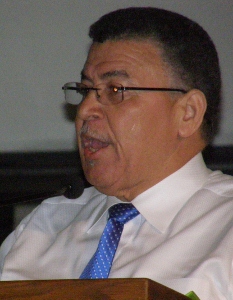
Mac: Allegations baseless
 (CNS): The premier has said that all of the allegations being made against him are baseless and that he will be taking action to restore his legal rights if he does not get a clear indication from the governor or the police commissioner soon that the investigations involving him have been concluded. McKeeva Bush said the two new investigations were as meritless as the first and, referring to the illegal shipment of explosives, he said the police commissioner had said it was a matter of not filing the right papers. “Well, what is that?” he asked rhetorically before acknowledging his involvement. “I am the minister of finance and it comes to me and I try to help someone,” he stated during Cayman 27’s "The Panel" on Tuesday.
(CNS): The premier has said that all of the allegations being made against him are baseless and that he will be taking action to restore his legal rights if he does not get a clear indication from the governor or the police commissioner soon that the investigations involving him have been concluded. McKeeva Bush said the two new investigations were as meritless as the first and, referring to the illegal shipment of explosives, he said the police commissioner had said it was a matter of not filing the right papers. “Well, what is that?” he asked rhetorically before acknowledging his involvement. “I am the minister of finance and it comes to me and I try to help someone,” he stated during Cayman 27’s "The Panel" on Tuesday.
Bush said the investigations were not just about destroying him as he had first suspected but they were also about destroying the Cayman Islands, and he reiterated his position that he has never been notified properly about any investigation into him.
“I have never received any formal notices relating to the investigations and I regard it as a political matter and it is clear to me that the opposition have a lot more information on the matter than I do. They are constantly on the radio making outrageous statements instead of trying to encourage investment … I have done nothing illegal,” Bush said on the local TV talk show, adding that he continued to serve the people and was doing his best to grow the economy and get people back to work.
“I look forward to a clear indication from the governor and the commissioner of police that whatever they are looking at, investigating, taking about or whatever they are doing … a fishing expedition or whatever, has been completed. If that is not forthcoming shortly, action will be taken to restore my legal rights, which have been trampled upon with scant regard to the rule of law,” the premier said.
As a result of advice from his attorneys, Bush said, he had chosen not to say anything about the police investigation on the “real estate transaction involving someone else”, which had started over two years ago. This, the premier said, was to give the police time to investigate fairly properly and without bias. “I knew on conclusion of that investigation I would be exonerated as there is no illegalities on my part whatsoever,” he added.
Bush did not seek to explain the letter that has been circulating in the public domain since last June, which raises a number of questions. He still did not say what the real estate transaction was or what service Windsor Development, a company of which he was a director at the time, had undertaken for a fee of more than $350,000.
Claiming there was nothing illegal involved, the premier dismissed the other two probes as well, also describing them as “fishing expeditions”.
“In light of the two new investigations, announced publicly by the governor last week without any notification to me, and the fact that over two years has passed and there is still no closure to the initial matter, is evident that these so-called investigations are nothing more than fishing expeditions,” Bush stated.
The premier said he believed he was the subject of what he described as meritless allegations because he had stood in the way of the Foreign Office on a lot of matters — “far more than the opposition would ever dare,” he added.
Bush said again that he would not step down from his position as premier because the allegations were baseless and what was there to stop it happening to anyone else who became premier if the FCO didn’t like them.
“Where does it stop? I am not guilty of anything. I haven’t done anything illegal other than to stand up to the powers that be over the years. They cannot drive me where they want to drive me and are prepared to do whatever they can to embarrass me,” Bush said. “I am not talked to, I am not charged with anything, I am not cautioned by anyone, so I am not stepping down or resigning because the PPM want the position.”
In the face of the opposition’s lack of confidence motion, Bush said that when he was ready he would deal with it but that they should not be filing no confidence motions against him when there were no charges or substance to the allegations. He said the opposition, the governor and the FCO were all after the same thing, which was “to get McKeeva out because they can’t control him”, and went on to list a number of occasions when he had clashed with the British government.
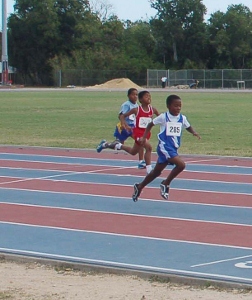
Young athletes urged to register for WAD meet
 (CIAA): The Cayman Islands Athletic Association will be hosting the annual IAAF World Athletics Day (WAD) at the Truman Bodden Sports Complex on Saturday May 12th starting at 9:00am. WAD began in 1996 and this year marks the 17th edition of this worldwide festival of youth in Track & Field and has attracted 158 IAAF Member Federations to take part. The goal of the IAAF World Athletics Day is to firmly establish an important link between the youth, our sport and environmental conservation. This Meet is opened to all schools, clubs and individuals, and will also serve as a qualifier for athletes preparing for upcoming regional and international competitions in the youth, junior and senior categories.
(CIAA): The Cayman Islands Athletic Association will be hosting the annual IAAF World Athletics Day (WAD) at the Truman Bodden Sports Complex on Saturday May 12th starting at 9:00am. WAD began in 1996 and this year marks the 17th edition of this worldwide festival of youth in Track & Field and has attracted 158 IAAF Member Federations to take part. The goal of the IAAF World Athletics Day is to firmly establish an important link between the youth, our sport and environmental conservation. This Meet is opened to all schools, clubs and individuals, and will also serve as a qualifier for athletes preparing for upcoming regional and international competitions in the youth, junior and senior categories.
With the Cayman Invitational Meet only a few days away, the association expects that this will attract a large turnout of enthusiastic athletes, who have hopes and dreams of emulating these athletic stars and one day becoming a professional athlete.
Events being contested for WAD are: 100m Hurdles, 110m Hurdles, 80m, 100m, 150m, 200m, 400m, 800m, 1500m, 3000m, Long Jump, High Jump, Shot Put, Discus, Javelin and Ball Throw.
Age groups eligible to compete are: 7-8, 9-10, 11-12, 13-14, 15-17, and over 17.
Registration forms are available on www.caymanactive.com/wad or by contacting Coach Williams at 925-1943, Coach Yen at 925-6917 or Coach Wason at 916-6966. Forms will also be available at Schools P.E. Departments and one is attached below.
Completed registration forms should be returned to any ofthe above persons or emailed to caymanathletics@gmail.com but registration closes on Thursday 10 May.
Registration opens for women’s flag football
(GCFFA): Flag football for females on Grand Cayman is one of the fastest growing sports, as reflected by the increasing number of participants and teams for the Grand Cayman Flag Football Association’s 2012 season, sponsored by DART. In its second year of inception, the GCFFA credits a successful 2011 season, both locally and internationally, for the growing popularity of the sport. “Last year we had just under 100 members a part of the GCFFA, and this season, with the addition of a couple more teams, we are nearing 150 female participants in flag football,” boasts the association’s President and co-founding member, Sophia Dilbert.
The GCFFA is encouraging females 17 and older who are interested in playing flag football this year, to email gcffa@ymail.com and register by Friday, May 18th. Registration is $25 per player with a cap of 18 players per team. The league kicks off with an open scrimmage on Saturday, May 26th at the Camana Bay Field.
The open scrimmage being held on Saturday, May 26th is to introduce new players to the game, have teams become familiar with league members, and to build camaraderie amongst the players.
“We want to remind females that even if they have never played before, or don’t know which team to approach, the association can place you on a team that has open rosters, or we can build an additional team,” informed Ms Dilbert. “No one is left out,” she added.
Reflecting on the 2011 season, out-going Vice President Christine Bisnauth noted that in its first year of operations, the GCFFA represented the Cayman Islands in a regional tournament in the Bahamas and the biggest national tournament in the USA held in Kissimmee, Florida.
The two teams that the GCFFA sent to the Bahamas came back victorious, claiming first and second place standings. Although their placing in the US tournament wasn’t as successful, it did expose the players to a heightened level of competition and also garnered much attention from teams across the US expressing interest in traveling to Cayman to participate in local tournaments.
“We are looking forward to an even better season,” says Ms Bisnauth. “With more teams and more female participants, the level of competition is rising. Our plan to develop an inter-school NFL Youth League is also developing; we are just waiting on the official confirmation from the NFL to begin our youth programme.”
“We would like to thank our league and team sponsors for their continued support: Dart Cayman Islands, Andro-Group, Domino’s Pizza, Hammerheads, Jagermonster, Lonestar, Hot 104.1FM, Maples, and all the companies and individuals who helped us with fundraising initiatives throughout the year,” Ms Bisnauth added.
The 2012 GCFFA board association members include President, Sophia Dilbert; Vice-President, Lilia Conolly; Treasurer, Darrel Porter; Secretary, Anna Nyaundi; Public Relations Representative, Kathy Miller; and Equipment Manager, Andrew Wisdom.
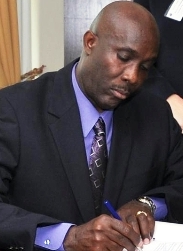
AG says firms must train young lawyers
 (CNS Business): The Cayman Islands attorney general has said that local law firms have an obligation to look out for and train young lawyers. The country’s top lawyer told the Legislative Assembly that it should be “in a lawyers DNA to look out for” and help younger members of the profession. Samuel Bulgin pointed to the tendency of lawyers in Cayman to “market themselves” as part of the financial services sector and as such were failing to recognise themselves as part of the legal profession. He said there was a need for members of the islands legal fraternity to be more unified and harmonious and face their moral obligation to train the next generation of lawyers. Read more on CNS Business
(CNS Business): The Cayman Islands attorney general has said that local law firms have an obligation to look out for and train young lawyers. The country’s top lawyer told the Legislative Assembly that it should be “in a lawyers DNA to look out for” and help younger members of the profession. Samuel Bulgin pointed to the tendency of lawyers in Cayman to “market themselves” as part of the financial services sector and as such were failing to recognise themselves as part of the legal profession. He said there was a need for members of the islands legal fraternity to be more unified and harmonious and face their moral obligation to train the next generation of lawyers. Read more on CNS Business

FOI appeals become more adversarial
 (CNS): In her latest quarterly report regarding the work of her office the Information commissioner has raised concerns that government departments are increasingly engaging lawyers to help them withhold records rather than trying to disclose them, as was intended by the Freedom of Information law. Jennifer Dilbert said that as the public becomes more aware of its rights under the law, the number and complexity of hearings and investigations being carried out by her officer is increasing but the process is becoming increasingly legalistic. Dilbert also reports that during the first quarter of 2012 her office handled a record number of appeals.
(CNS): In her latest quarterly report regarding the work of her office the Information commissioner has raised concerns that government departments are increasingly engaging lawyers to help them withhold records rather than trying to disclose them, as was intended by the Freedom of Information law. Jennifer Dilbert said that as the public becomes more aware of its rights under the law, the number and complexity of hearings and investigations being carried out by her officer is increasing but the process is becoming increasingly legalistic. Dilbert also reports that during the first quarter of 2012 her office handled a record number of appeals.
She said that between 1 January and 31 March twelve new appeal files were opened and two were closed, the largest number of appeals received in one quarter to date.
Dilbert explained that the hearings were becoming increasingly complex as cases naturally work their way through the system and she pointed to the non- or partial disclosure, procedural or legal questions, a lack of response from the public authorities as well as incorrect interpretation and unexplained applications as some of the issues her office was dealing with when handling appeals and hearings. She said that applicants may at times be unclear in the precise scope of their requests, further complicating the problems.
Dilbert pointed to the adversarial approach now adopted by some public authorities as they try to prevent the release of documents and information.
“An increasing number of public authorities engage legal counsel to deal with FOI requests, especially once an appeal has been raised,” Dilbert wrote in her report. “This puts additional pressure on the ICO as the approach becomes increasingly legalistic and adversarial, with a greater emphasis on withholding records, rather than maximum disclosure as intended in the Law,” she added.
According to the latest statistics, since the FOI law came into force in 2,295 requests for information have been filed with public authorities by members of the public by the end of March this year. In that time 90 appeals were opened by the ICO and 74 of them closed. Nineteen hearings have already been conducted and a twentieth is currently underway. During the last quarter of 2011, 193 Freedom of Information requests were logged by public authorities, representing a 69% increase in requests over the previous period and covered 58 out of the 91 public authorities.
However, Dilbert revealed that 25 public authorities failed to submit their information to the ICO before the deadline, despite reminders from the office. The commissioner said that authorities which continue to be non-compliant will be named in future quarterly reports.
Of the many other issues analysed in the report, Dilbert also writes that despite the legal requirement to review the freedom of information legislation and the formation of a review sub-committee, chaired by Attorney General Sam Bulgin, almost two years ago, there has been no progress on the law review.
See full quarterly report below and for more information visit www.infocomm.ky
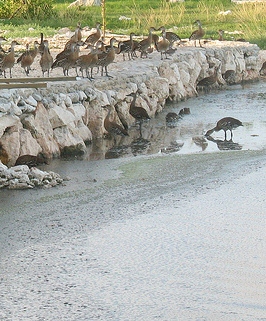
Critical habitat threatened
 (CNS): The one and only remaining animal sanctuary on Cayman Brac is losing its protected status because of a bad smell. Government has gazetted an amendment to the Animals Law which will remove Salt Water Pond from the list of animal sanctuaries in the Cayman Islands. The pond, which is a critical habitat and home to several bird species including the endangered West Indian whistling duck, has created a problem for a hotel owner in the area and, as a result, government is lifting the protected status. The DoE has advised government that the retrograde step could cause problems in terms of Cayman's international obligations on the environment.
(CNS): The one and only remaining animal sanctuary on Cayman Brac is losing its protected status because of a bad smell. Government has gazetted an amendment to the Animals Law which will remove Salt Water Pond from the list of animal sanctuaries in the Cayman Islands. The pond, which is a critical habitat and home to several bird species including the endangered West Indian whistling duck, has created a problem for a hotel owner in the area and, as a result, government is lifting the protected status. The DoE has advised government that the retrograde step could cause problems in terms of Cayman's international obligations on the environment.
As in all cases where methane builds up around swamps, the DoE’s position has been to advise against allowing development too close to swamps and wetlands by setting designated buffers around them.
It is not clear what the government or the hotel owner will do to the pond, which is also known as Dennis Point Pond, once its sanctuary status is removed to stop the smell but the amendment bill states: “An offensive odour has been emanating from the pond due to the decomposition of its organic material.” Although some efforts have reportedly been made to address the issue in the past, they have given only short term relief from the smell, which is part of a natural process.
The pond, located on the West Side of Cayman Brac, is one of very few wetland areas on the island and is a critical habitat. Aside from being home to endangered local species, the wetlands are important for migratory birds, including snowy egrets and herons which have been spotted at the pond. There are concerns from a number of local environmentalists about the sanctuary removal and its implications for conservation in general. The director of the Department of Environment described the move as a retrograde step.
“The DoE views the removal of protections on the only remaining Animal Sanctuary on the Brac as extremely regressive from a national conservation perspective and would urge the government to consider its responsibilities under the Convention on Biological Diversity, the Bonn Convention on Migratory Species and the Ramsar Convention on wetlands, as well as the possible negative press from such a decision,” Gina Ebanks-Petrie told government when the removal of the ponds protection was discussed with her department.
In her advice note to the ministry she pointed out that if the decision was taken to remove Salt Water Pond as an Animal Sanctuary, then the DoE strongly recommended another wetland area of at least equivalent size and environmental value be acquired and protected at the same time as Salt Water Pond is de-gazetted. She said that the DoE would be able to assist with the selection of such a site. Ebanks-Petrie indicating that there were a number of possible locations but the department has never been consulted and no new site has been earmarked for protection.
There are also concerns that it is not just the smell that is behind the removal of the protection under the animal law as the premier stated in the summer of 2009 that his government would support efforts by the owner of the Alexander Hotel to construct a marina at the Salt Water Pond. This would mean the pond would need to be dredged and also require the construction of a canal from the pond to the sea.
With so few areas of protection on the Brac, the de-gazetting of this critical habitat does not bode well for hopes of expanding eco-tourism on the Sister Islands.
During his recent visit to the Cayman Islands Henry Bellingham, the FCO’s minister with responsibility for the Overseas Territories, pointed to the importance of environmental protection. He said that some 80% of the UK’s ecological diversity is found in the territories. In addition, the UK has obligations under various conservation treaties to the international community and the removal of this critical habitat, especially for development purposes, could create problems under those agreements.
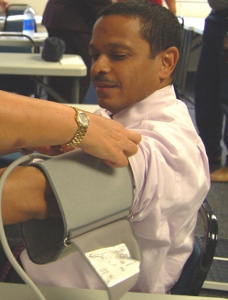
Health stats shape-up policy
 (CNS): The results of the first ever comprehensive health survey in the Cayman Islands will help to inform government policy on health issues and enable it to measure the effectiveness and success of future policies regarding non-communicable diseases. Speaking at the launch of the country’s first health survey, the health minister said that high quality health statistics are essential for planning and implementing health policy. Mark Scotland announced that the health risk survey was a priority and that it would start on Monday, 14 May. Despite the many other issues of national importance, Scotland said Cayman could not afford to neglect the growing epidemic of chronic disease.
(CNS): The results of the first ever comprehensive health survey in the Cayman Islands will help to inform government policy on health issues and enable it to measure the effectiveness and success of future policies regarding non-communicable diseases. Speaking at the launch of the country’s first health survey, the health minister said that high quality health statistics are essential for planning and implementing health policy. Mark Scotland announced that the health risk survey was a priority and that it would start on Monday, 14 May. Despite the many other issues of national importance, Scotland said Cayman could not afford to neglect the growing epidemic of chronic disease.
“Presently there are many other urgent national issues on the agenda, making it easy to forget just how big a problem chronic disease has become,” he said at Monday's launch. “Chronic non-communicable disease is a silent and growing epidemic that, if left untended, could strain our healthcare system — and resources — severely.
The minister explained that measuring the risk factor data was crucial for predicting the future burden of chronic disease on the local population and to identifying potential interventions to reduce the future burden.
He said the survey should have been done years ago but now sixty enumerators had been trained and would going out into the community to visit a selected sample of households. They will collect information on demographics, alcohol use, fruits and vegetables consumption, physical inactivity and tobacco smoking. At the same time, enumerators will take measurements on weight, height, waist circumference and blood pressure. A smaller sample will also be selected for biochemical measurements of blood glucose and total cholesterol, which will be done at the Cayman Islands Hospital.
Although some health questions had been asked on the recent national census, the minister explained that this survey will gather more specific information on health risks as well as on specific non-communicable disease indicators which can be used to assess the predisposing factors to these deadly diseases.
“This will allow us to establish a baseline for the country, and since it is being done using WHO methodology, we can then compare with other countries. The survey will be updated in the future and we will then be able to measure the success of policies and strategies that were implemented,” Scotland said.
He pointed out that the burden of chronic disease across the Caribbean was growing rapidly and ailments such as hypertension, heart disease, stroke, cancer, diabetes, and respiratory diseases were now the leading causesof death. The census has already revealed that high numbers of people are living with high blood pressure, diabetes and asthma in the Cayman Islands.
“Locally, we have already invested in strengthening healthcare delivery to patients with chronic illnesses by launching the primary health care programme CayHealth. Over time, this programme is envisaged to provide better outcomes to patients suffering from chronic illnesses while also saving resources. An added bonus of this programme is the fact that it allows us to track non-communicable diseases in a target population, giving us vital health statistics for future planning,” he stated.
Scotland also revealed that the first stakeholders’ meeting for developing a National Health Policy would be held this week. “This meeting’s purpose is to create an overarching, guiding policy that outlines what our vision, goals and objectives are for our nation’s health,” he said. “Unlike for the flu and other viruses, there are no vaccines against chronic diseases. Instead, the solution lies in education, prevention and management of these illnesses,” Scotland added.
Officials encouraged members of the public that are selected to participate in the survey to cooperate and provide the information to the enumerators, which will be held in the strictest confidence but will be used to help make Cayman a healthier nation.
See more details aboutthe project on the website: www.ministry of health.gov.ky/healthy nation
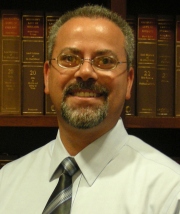
New members appointed to constitutional commission
 (CNS): Jude Scott has been appointed to chair Cayman’s Constitutional Commission by Governor Duncan Taylor following the death of Pastor Al last year. Sara Collins has also been appointed to the three person commission and will replace Julene Banks, who has now completed her two year term. Wil Pineau will continue to serve alongside the new appointees as a member. This is the first time new appointments have been made to any of the constitutionally created commissions since the implementation of the 2009 Constitution Order.
(CNS): Jude Scott has been appointed to chair Cayman’s Constitutional Commission by Governor Duncan Taylor following the death of Pastor Al last year. Sara Collins has also been appointed to the three person commission and will replace Julene Banks, who has now completed her two year term. Wil Pineau will continue to serve alongside the new appointees as a member. This is the first time new appointments have been made to any of the constitutionally created commissions since the implementation of the 2009 Constitution Order.
The commission was established under Section 118 of the 2009 Constitution. Its remit is to advise government on questions concerning constitutional status and development; promoting public understanding and awareness of the constitution and its values, and publishing reports, papers and other documents on any constitutional matters affecting the Cayman Islands. In broad terms, this commission may be said to combine the functions of an advisory body with those of a think tank on constitutional matters.
The commission clashed with government last year when it offered advice on the creation of district councils and pointed to the North Side district council being an example of what they believethe architects of the constitution had in mind. The premier accused the commission of going beyond its remit and misusing their position as they were trying to influence public opinion on the controversial issue after he brought the law to create the local bodies under an appointment system by Cabinet
Bush accused the commission of “poor performance” of its mandated functions and said the members were against him. Bush said the commissioners needed to be better “schooled in their role and functions” as he accused them of attempting to “frustrate” his administration. Despite the function of the commission, Bush said no government would base its executive decisions on the advice of a Constitutional Commission.
Speaking about the new appointees to the commission, the governor said he was pleased that both Scott and Collins had accepted the appointments as he pointed to the commission’s role in promoting democracy.
“The Constitutional Commission plays an important role in our democracy and I am confident that these new members will work together with Member Wil Pineau to continue to educate the people of the Cayman Islands on the 2009 Constitution” said Taylor.
Jude Scott is the current Global Chief Executive Officer of Maples and Calder, a post he has held since 1 February, 2011. Previously an audit partner at the Cayman Islands office of Ernst & Young, Scott retired in 2008 after spending over 23 years with firm, specialising in the audits of investment funds, investment companies, banks and insurance companies.
Scott has served on various Cayman Islands Government and private sector boards and committees, including the Cayman Islands Society of Professional Accountants, the Cayman Islands Financial Services Council, Cayman Airways, Cayman National Corporation, the Ministerial Council for Tourism, the Education Council, the Insolvency Rules Committee and the Stock Exchange.
Sara Collins is a former partner of Conyers Dill & Pearman in the Cayman Islands. A graduate of the London School of Economics, she was admitted as a barrister of England & Wales as well as an attorney at law in the Cayman Islands; though she is not currently practising in either jurisdiction. Collins was also chair of the Human Rights Committee, the forerunner of the current commission, and was a member of the constitutional negotiating team.
For more information on the Cayman Islands Constitution Order 2009 or the Constitutional Commission please visit: www.knowyourconstitution.ky; e-mail info@knowyourconstitution.ky or call 244-3685 or fax 945-8649.